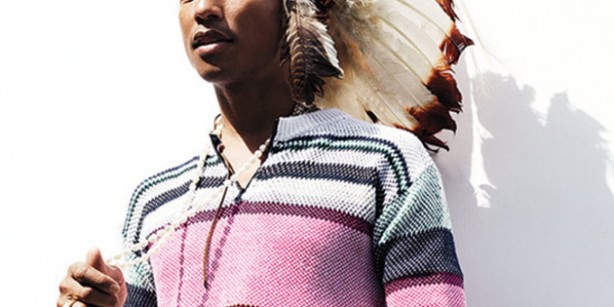 Music
Music
5 musicians who were unintentionally ignorant about race, gender, and identity
by James Wilt
June 18, 2014
It was perhaps the least calculated, most regrettable thing I’ve ever said.
Partway through a newspaper design class, while all the students waited for our prof to come check out our individual assignments, I remarked to a close friend (who’s neither male nor white) that my work would be assessed first because I’m both a man and white. It was supposed to be satire. The remark was just a casual barb. Some playful banter. As if. What I’d unintentionally done was regurgitate centuries of rhetoric used to subjugate and persecute. We didn’t speak for months.
I deserved every minute of regret. Two realizations emerged from the despicable asshattery. Firstly, no matter how well intended, communication is very much a two-way thing. Any appeal I could’ve made—regardless of if it’s satire or good intention—is rarely justified when historic power dynamics are in play. Secondly, when you’re being accused of sexism / racism / homophobia / transphobia / ableism by multiple people, your right to defend yourself is almost always forfeited. Obviously, there will be exceptions to this—the #CancelColbert debacle comes to mind—but sincerely apologizing is often the way to go.
Louis CK perhaps provides the best frame of reference for the upcoming discussion. His segment from “Hilarious” about identity slurs is well known to anyone who’s spent a significant amount of time on Reddit. But as Eric Anthony Glover of Midnight Breakfast put it, “expecting marginalized individuals to simply turn off their sensitivity at the drop of a hat—even for the sake of comedy—is a sometimes impossible request.” Let’s keep that in mind.
Unfortunately, as the last few months have proven all too clearly, many high-profile musicians haven’t received the memo. What follows are only five nasty examples of usually intelligent people with seemingly (and self-proclaimed) good intent, who manage to piss off historically victimized groups with ignorance and a refusal to apologize. This post isn’t about censorship; it’s about privileged folk learning how to not be assholes. Shouldn’t be too hard, right?
Macklemore
So many pixels have been spilled on the awkward enigma that is Macklemore. The Seattle-based rapper, who blew up in late 2012 with his album The Heist, has since come under the scrutiny of many for a few very good reasons. “Same Love,” his pro-gay marriage song which won the problematic prize of the MTV Video Music Award for Best Video with a Message, is a prime example: he creates a catchy, Whole Foods-friendly anthem that includes clunky lyrics, assurances that he’s not gay, and loads of attention for him. Nice combo.
But now, Mr. Mack has surpassed past criticisms (which, for the record, also includes his self-aggrandizing Instagram posting of his “apology” to Kendrick Lamar for “robbing” Lamar of the Grammy for Best Rap Album). On May 17, Macklemore performed at Seattle’s EMP Museum in a disguise that looked strikingly like something from a Nazi propaganda poster: a hooked nose, a bowl cut, and a black beard. As Seth Rogen put, “if I told someone to put together an anti-Semitic Jew costume, they’d have that exact shopping list.”
Macklemore resorted to the classic “miscommunication” retort: he tweeted two days after the show that the costume was “not my idea of a stereotype of anybody.” Too bad it doesn’t quite work that way. Later that day, he went so far as to post a full “explanation,” reiterating everyone’s misunderstanding of the performance. “The character I dressed up as on Friday had no intended cultural identity or background,” he assured. Later, he claimed it was “surprising and disappointing” that he was accused of such things. No real apology issued. Macklemore goes home sad.
Transit
Transit, the twenty-something-year-old Calgary rapper, has been doing a bunch of pretty offensive, but uncriticized shit, as of late. Back in April, he tweeted that “Rihanna’s topless photos are about as sexy as the first time you saw nip in National Geographic,” which reeks of some good old-fashioned colonial-era exoticism. Then, in May, in the wake of the Elliot Rodger shootings, he posted that “yo this mass murder thing is disgusting. If you can’t get girls, pick up a guitar or pen & write a song about it like the rest of us. Then you’ll get girls.” Righteo.
But the award for unapologetic douche-baggery goes to his song “Friend Zone.” The song chronicles his struggles to woo a childhood friend—which doesn’t sound awful on the surface—but the track quickly descends into calling her “skanky” and petitioning for her to “let me treat you how you need to be.” Considerate critiques on the YouTube video were swiftly dismissed by the rapper, with the claim that “the whole thing is satirical & meant to comfort anyone who has been ‘friend-zoned.’” Casual sexism is fine if it’s satirical and meant to comfort, I suppose. It’s the white dude trump.
Arcade Fire
This case is all sorts of weird. As self-proclaimed social critics—namely of cars, Bibles and cameras—Arcade Fire obviously had to make a video called “We Exist” about… well, it’s not exactly clear. Something political. The main character might be cross-dressing, or transgender. Win Butler insists on calling the person “gay” in interviews. Repeatedly.
Anyway, this character struggles with gender identity by going through all this shit, and ends up at Coachella. Specifically, at an Arcade Fire show. Nice how that works. Andrew Garfield, a.k.a. Spiderman, plays the “gay” lead. As to be expected, tempers immediately flared. Tom Hawking of Flavorwire noted that “if the Arcade Fire really wanted to be radical here, they could cast a video with a trans character—played by an actual trans woman, even!—who goes out, has an awesome time, goes home, wakes up, and goes to work in the morning.”
But shit didn’t get really real until Against Me!’s Laura Jane Grace showed up. Among many other critiques, she pointed out via Twitter “it’s called ‘We Exist’ and there is literally no signs of that existence represented. It should have been called ‘They Exist.’” Admitting fault would’ve been too much for Arcade Fire, obviously.
Instead, Butler said to the The Advocate that “there was just so much thought and love that went into the video I don’t personally see it as negative.” Well, it’s a good thing Butler wasn’t offended. This, once again, suggests the fallacy of the First Amendment argument that plagues forums all over the internet: the ability to say something shitty doesn’t mean that others aren’t going to be resistant to it. Stick to the suburbs if you’re going to be that painfully negligent.
Mastodon
For this example to work, you’re going to have to forget everything you think you know about Mastodon’s fan base. Because that’s exactly what the band did when they created a satirical Thanksgiving t-shirt, above, featuring a pilgrim aiming a rifle at a kneeling indigenous woman who’s offering a cooked turkey in return. At heart, this imagery—later explained by the band on their Facebook page—was intended to point out that “celebrating in the face of [the] atrocity” of the massacre of indigenous peoples is a “chilling” act.
But satire is complicated. Chartattack’s Jordan Darville accurately pointed out that “the shirts cost $22, and there’s no indication that a fraction of the proceeds go towards any sort of Aboriginal charity.” In an open letter, Erica Violet Lee—who’s part Cree and Maori—wrote that “there are better ways to make political statements than printing t-shirts with disturbing imagery that reinforces racist myths rather than challenging them.”
Lee compiled a list of quotes by fans who responded to Mastodon’s Facebook apology (which consisted of the band claiming their critics didn’t “get it”). Such comments included “all I know is that I’m thankful for smallpox blankets lol” and “fuck em, they all just drunks anyways.” Mastodon isn’t Vine Deloria, Jr. or Howard Zinn. Few fans would’ve expected the subtle commentary. And ultimately, just like Washington Redskins controversy, it’s not up to white people to decide what’s offensive or not.
Pharrell Williams
Since we’re on the topic of commodifying indigenous struggles—and there’s absolutely no shortage of such incidents, with the Redskins and Flaming Lips fiascos at the current—let’s address the most recent of offences: legendary beatmaker and mediocre singer Pharrell Williams wearing a traditional headdress on the cover of Elle UK. To be sure, the magazine itself claimed to be responsible for the cultural slight. Before the controversy erupted, that is.
This situation really isn’t that complicated. Megan Red Shirt-Shaw pointed out in an opinion piece for ThinkProgress that “only warriors of great renown were allowed to wear a bonnet so embellished” and that headdresses are “sacred to our communities.” Simple shit. But, of course, the reaction was predictable: the top-ranked comment on CBC’s reposting of Shirt-Shaw’s piece includes the phrase “it’s only a head dress, it’s not about you. Don’t be so touchy.”
Thankfully, Pharrell responded quickly to the criticisms, acknowledging in a statement a day later that “I am genuinely sorry.” Well done, in that regard. But let’s also take this as a lesson. Wab Kinew, one of Canada’s preeminent young Aboriginal spokespeople, tweeted “Hey @Pharrell I’m inviting you to a traditional Sundance so u can learn about the sacrifice that’s put in before someone wears a headdress.” Consider power dynamics before making seemingly meaningless decisions. Period.
Tags: Music, arcade fire, Macklemore, Mastodon, Pharrell, Transit







